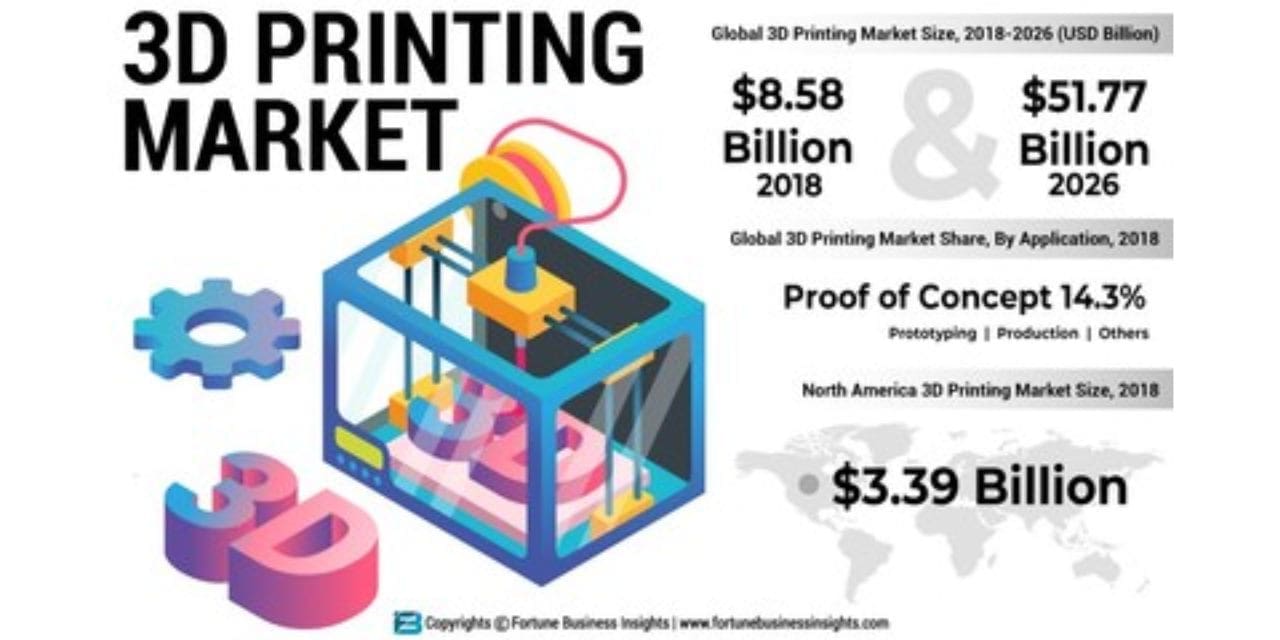The 3D Printed packaging market size is projected to be valued at US$ 1,210 million in 2023 and is expected to rise to US$ 2,560 million by 2033. The sales of 3D Printed packaging are expected to record a significant CAGR of 7.8% during the forecast period.
The packaging industry, like other industries such as aerospace and medical, has been revolutionized by 3D printing. In the past decade, the use of additive manufacturing in the packaging sector has increased significantly. Providing a wide range of material options, including metal, plastics, and even food.
As 3D printing technology advances, value chains are evolving to meet the rapidly developing markets’ growing and diverse needs. Currently, numerous industrial and commercial 3D printing installations operate as stand-alone units. As they are not integrated into the overall manufacturing environment and workflow.
3D printing possesses the potential to transform product design, manufacturing processes, value chains, and the marketplace’s structure.
Companies have extensive experience incorporating 3D printing into their design and manufacturing workflow. Such as Airbus, Lockheed Martin, and Boeing are developing integrated manufacturing systems. As it seamlessly incorporates 3D printing into the factory environment and workflow.
The leadership in the global 3D printing marketplace is expected to remain in North America and Western Europe. While Asian companies increasingly manufacture low-cost, lower-capability 3D printing machines. These are favoured by hobbyists, DIY enthusiasts, casual schools, and commercial users.
The widespread adoption of 3D printing processes is likely to transform value chains and supplier-customer relationships dramatically. These innovations address natural evolutionary pressures that affect any new technology. Such as increased production speeds, process efficiency and reliability, reduced machinery and systems costs, and improved product quality and uniformity.
The 3D Printed Packaging Sector is Continually Evolving and Various Emerging Trends are predicted to Influence the Industry’s Outlook
· As 3D printing technology progresses, so are the materials utilized in the printing process. Highly advanced materials, such as biodegradable plastics, nanomaterials, and conductive materials, are projected to emerge in the market. Allowing for the production of more sophisticated packaging solutions.
· Hybrid printing combines 3D printing with traditional printing technologies such as screen printing or offset printing. This trend is predicted to gain traction in the packaging market. Since it enables the creation of customized packaging solutions with intricate designs, textures, and colours.
· Mass customization is the manufacture of customized products on a massive scale, and it is a trend that is gaining steam in the 3D printing sector. Mass customization enables the creation of one-of-a-kind packaging solutions for various products without the requirement for costly tools or machinery.
· Supply chain digitization is a movement that is revolutionizing the packaging business. Businesses may cut lead times and increase supply chain efficiency by embracing technology such as 3D printing. It also allows organizations to work more directly with suppliers and customers, boosting communication and lowering the possibility of errors.
Regional Analysis
North America Accounts for 33.34% of the 3D Printed Packaging Market
This is due to the increasing use of 3D printing technology in areas such as automotive, aerospace and defence, healthcare, and consumer goods. The region also boasts a well-established and matured 3D printing sector. Numerous significant businesses are present, making it a research and development hub. There is a growing requirement for sustainable and eco-friendly packaging in numerous markets. Similarly, increasing the need for customized packaging solutions are likely to boost the expansion of the 3D printed packaging market in North America.
The United Kingdom, Germany, and France are Key Countries in Europe, Contributing to the Market’s Expansion
Europe is a key market for 3D printed packaging, accounting for a sizable portion of the global market. The increasing implementation of printing technology in numerous end-use industries such as automotive, aerospace and defence, and healthcare is driving market expansion. Furthermore, the existence of well-established 3D printing enterprises, research institutions, and favourable government efforts is anticipated to boost market expansion in Europe. The growing need for personalized and sustainable packaging solutions is also predicted to drive the expansion of the region’s 3D printed packaging industry.
Asia Pacific is one of the Swiftly-growing Markets Recording a CAGR of 21.63%
The implementation of 3D printing technology is increasing in numerous industries. Such as automotive, aerospace and defence, and healthcare can be contributed to the region’s market growth. Furthermore, rising disposable incomes and changing consumer tastes are likely to increase demand for customized and sustainable packaging solutions. Ultimately supporting the region’s market expansion.
China and Japan are the region’s two prominent markets, accounting for a sizable portion of revenue. These countries’ market growth can be ascribed to strong manufacturing capabilities, technical advancements, and a well-established industrial base.

